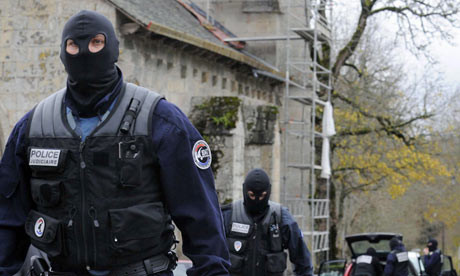Terrorized language ...
Jean-Marie Gleize's meditations on discourse and the state ...

Jean-Marie Gleize, Tarnac, A Preparatory Act. Ed: Joshua Clover. Trans.: Joshua Clover, Abigail Lang and Bonnie Roy (Kenning Editions, 2014), 168 pp., $14.95—On November 11, 2008, a hundred and sixty French policemen descended into the village of Tarnac and arrested nine individuals who were eventually charged with conspiracy to commit a terrorist act, the act in question being sabotage of the rail system. Tarnac, the first major work by Jean-Marie Gleize to be translated into English (another volume is due to appear in 2015), confronts this case through the question of discourse, a "problem" at the heart of Gleize's “post-poetry,” developed from his initial concepts of littéralité and nudité, and later folded into the singular dispositif.Readers familiar with modern French poetry will hear echoes of Francis Ponge, among others. But Gleize’s poetics also return poetry to the scene of its banishment in Plato’s Republic. Tarnac is thus as much a defense of poetry as it is of Tarnac, an attempt to link both “cases” insofar as both remain “suspect” under the separate but interrelated jurisdictions of cultural and political states. . Insofar as Gleize attests to Plato’s suspicions that poetry threatens social, and thus political, order, Tarnac is a series of discrete commentaries and meditations on modern French culture, evoking, among other things, Christian socialism and the 1968 student riots in the context of Gleize’s own life. However, Tarnac is not autobiography. Gleize blurs genres, as autobiography slips into biography, biography merges with poetry, and poetry settles into meditation. Thus the key to Gleize’s post-poetry turns out to be neither “post” nor “poetry.” Instead, the hyphen, bridge and gap, functions as a simulacrum of both poesis and, in every sense, the prosaic. For example, “dust” appears in almost all the seventeen sections that comprise the work. As such, “dust” functions as a leitmotif, and at the same time it mimics a conceit. Neither the prevalence nor the persistence of dust (“The rain will continue for several hours, several days and several nights. It continues for a while, a long while. It cannot erase the dust.”) is a metaphor, much less an extended metaphor, despite the Adamic aura (all the figures here—poet, penitent, political activist, etc.—that die, that are killed, that are martyred, are men). At the same time, Gleize is not interested in mere reportage. Four photographs of landscapes, found on a street, comprise the section “Static Shots.” In a subsequent section titled “TRNC,” the photographs are “read”: “He now believes that the four photographs correspond to the four letters of the name found to be TRNC, to the four letters of the village’s name traced in chalk on the slate grey of the slate, and the name is friable.” The allusion to the Latin abbreviation Pontius Pilate had scrawled atop the cross of Jesus (INRI) is rather obvious. Perhaps the most politically charged sections in the book are “F Documents” and “Insurrection.” In the former Gleize cites the anti-money, anti-private property, values that “prepare” the ground for the “argument” of the latter: “A revolutionary movement does not spread by/ contamination But by resonance…” Flipping Olson’s trope of space as the “essential condition” of the American, Gleize disables the Cold War rhetoric (always a question of distance and containment) that has been appropriated for anti-terrorist strategies: “An insurrection is not like the/ propagation of the plague or a forest fire…It becomes embodied in a/ MUSICAL way…” Were there more space here I could show how Gleize’s trope of the “musical,” as opposed to the literary, is inseparable from the possibility of the “Euro” as capital readjusts to a hypostatized economic “commons” that absorbs all expression. But not, importantly, impression. Suffice it to say Tarnac is required reading for those interested in new possibilities in poetics and politics. (I also recommend downloading a free related .pdf with the provocative title, The Coming Insurrection, written by members of the Tarnac commune).
Hunches, hedges, etc.